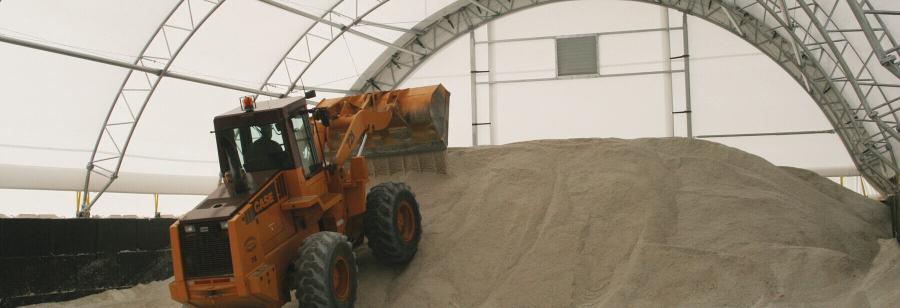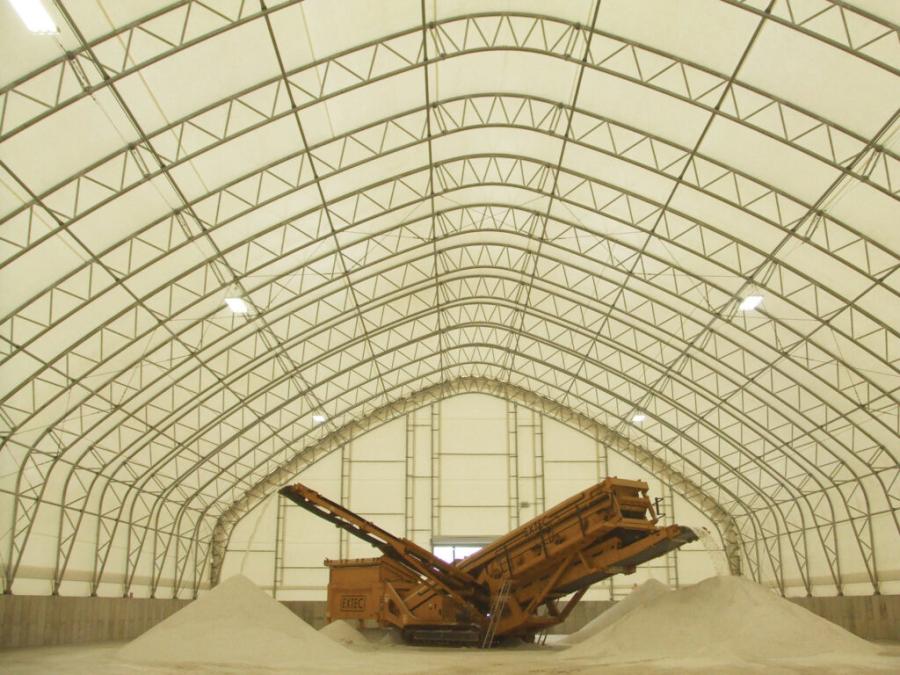In addition to being well protected, salt storage needs to have maximum accessibility for workers and vehicles who are responsible for transporting it. Fabric salt sheds provide a number of features that ensure municipalities can easily retrieve salt when they are rushing to beat a winter storm.
As winter approaches, municipalities and DOT's in snowy regions have to prepare for the change in weather and the impending storms that come with it.
For road travel to continue uninterrupted, cities and towns must be ready to assist the general public with an ample supply of road salt. However, road salt storage presents a unique set of challenges, and not just any salt shed will serve as an adequate storage space.
Fabric structures offer a unique and effective alternative to traditional salt sheds. For operations that are limited on space, suffer from poor ground conditions or just have an old unreliable structure, fabric buildings guarantee a suitable salt shed that can last well into the future. With a number of added advantages, municipalities can design the ideal salt shed for their operation, while reducing costs and maintenance needs and improving efficiency.
Superior Salt Shed Environment
Municipalities require a space where they can store as much salt as possible and guarantee it's well protected from the weather. The expansive interiors of fabric salt sheds allow for larger quantities of salt to be stored at a time, which is helpful for municipalities that need to prepare for a number of storms during the winter.
The cover keeps rain and snow out and eliminates the possibility of losing salt volume. Unprotected salt piles lose a significant portion of their volume annually, which can cost operations money and leave them unprepared for winter storms. This makes it crucial for municipalities to find a storage solution that they can rely on year-round, not just when the snow hits.
As a highly corrosive substance, salt requires a storage area that won't break down easily. ClearSpan's fabric salt shed uses triple-galvanized framing, so it can withstand corrosive environments. Galvanization helps ensure the building is durable, while additional building options can be included to prevent the salt from ever touching the frame, like ClearSpan's pre-stressed concrete walls.
Fabric buildings can be designed to provide natural ventilation, which can prevent moisture and condensation from affecting the quality of a salt supply. In the absence of moisture, corrosive materials, like salt, have little effect, so quality air movement and ventilation are valuable traits for a salt shed to possess.
The covers also are climate-sensitive, which keeps the building's interior 10 degrees cooler in the summer and 10 degrees warmer in the winter. This helps further improve the climate for stored salt and keeps workers in the salt shed comfortable.
Ultimate Convenience
In addition to being well protected, salt storage needs to have maximum accessibility for workers and vehicles who are responsible for transporting it. Fabric salt sheds provide a number of features that ensure municipalities can easily retrieve salt when they are rushing to beat a winter storm.
Fabric structures are designed to improve and simplify the process of loading salt spreaders and replenishing salt stocks. Salt sheds feature high clearances, so even large vehicles can fit into the opening, and workers don't need to worry about the structure interfering with their ability to load salt spreaders.
The buildings feature no internal support posts, meaning there is nothing to hinder workflow, vehicles or the amount of available space. For operations in need of additional room, they can build their salt shed on a pony wall, which increases the height and sidewall clearance without affecting the structural integrity.
ClearSpan's fabric buildings come in a variety of profiles to support the needs of different operations. A commodity-style salt shed comes with a completely open side wall and makes access to salt and other aggregates even more convenient. If municipalities need to store other commodities, like sand, dividers can be added to the building to maintain organization. Commodity-style salt sheds allow for increased efficiency and easy access to a variety of different stored materials.
Operations also benefit from the simpler design and installation process of fabric buildings. The salt sheds are shipped to sites in pre-built parts, meaning they can be erected in a much shorter amount of time than other buildings. Quick construction timelines keep operations moving and offer a valuable solution to those in need of a quick building before the snowy season hits.
Safety, Longevity Prevent Salt Leaching
When it comes to safety, ClearSpan buildings help municipalities ensure their workers and the surrounding environment are well-protected. With plentiful space and excellent visibility from natural light, workers have room to move around and can see everything that's around them, including active machinery.
The weather-resistant covers not only keep the salt protected, but also prevent any impact on an operation's surrounding environment. By keeping rain and snow out, salt sheds reduce the likelihood of salt leaching out of mixed piles and contaminating streams, wells or groundwater. This keeps the local community from being affected and ensures operations are as safe as possible.
Due to salt sheds often being placed in harsh environments, fabric structures are designed to be installed in nearly any location. They are constructed using the highest-quality materials and manufacturing strategies, which helps them be so expansive and durable. Their structural versatility allows them to be erected under difficult circumstances, like where ground conditions are poor, or space is limited.
Most buildings must meet local snow and wind loads to be constructed, and fabric structures are no different. Salt sheds can be engineered to stand up to even the most extreme weather, including wind loads of up to 185 mph and snow loads of up to 100 lbs. Upon request, the buildings also can include stamped engineered drawings to ensure the building's structural integrity.
ClearSpan salt sheds come with warranties of 20 years for fabric covers and 50 years for framing. This guarantees operations that their structure will last decades without breaking down, in spite of corrosion or severe storms.
For municipalities looking at a new salt storage solution, a fabric building offers a number of advantages over typical salt sheds. Regardless of location or limited available space, operations should consider a fabric structure to keep their salt protected and ensure their community is always ready for dangerous winter conditions.
For more information, visit www.clearspan.com/news/fabric-structures-an-ideal-salt-shed-solution/.
Today's top stories














